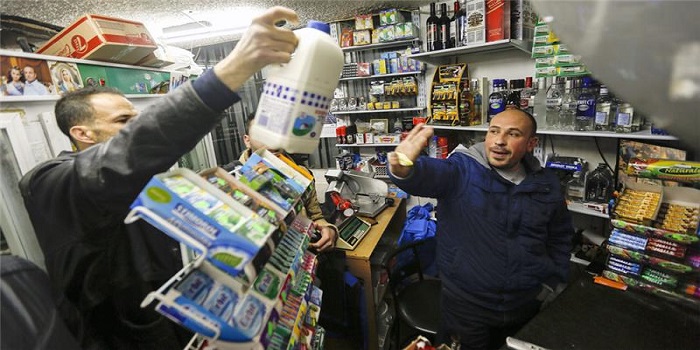Workshop Recommends the Need to Restore Confidence in Palestinian Products
Translated by Sabrin Qadah
the participants in the workshop titled "Mechanisms of supporting Palestinian products" organized by a coalition of Palestinian consumer protection associations recommended "the need to make a greater effort to restore confidence in Palestinian products to focus more on quality and spending on promotion, advertising, introducing products and packaging, which attracts the consumer.
Minister of the national economy Abeer Odeh stressed that the ministry is working on supporting Palestinian products through the modernization of the industry, the opening of new markets, and developing laws and policies. She said: we have decided to grant preference to Palestinian products that are specifications complying even if their prices increased of a certain percentage.
She added: We must be subjective and not to put the whole responsibility on the government; there are roles on industrialists, importers, traders and the consumer that no one can force them to any product as its their complete right of choice. However, we must raise the consciousness towards Palestinian products.
In turn, the general coordinator for the coalition of associations of the Palestinian Consumer Protection, and the head of Ramallah and Al-Bireh Society Salah Haniyeh, submitted a questionable position paper on ways to support Palestinian products. He said that this paper is based on a study of the MAS Institute, and centered on the government choices to support the Palestinian products, either through increasing Palestinian market share of the product through protection procedures in order to reduce exports and compensate it with increasing Palestinian production, Or it seeks_ meaning the government_ to provide direct and indirect support for products to increase their competitiveness against the rest of the products.
He added that the terms of reference of this paper are the developmental speech of President Mahmoud Abbas, which stimulates the economic and social development and taking participatory practical steps between the major parties, as well as the formation of the economic development team headed by Prime minister Rami Hamdallah, following up on the recommendations of the Economic Conference organized by the MAS Institute, and the directives of Prime Minister during his meeting with the Palestinian Society for consumer Protection.
The General Manager of Palestine Standard Institution, Haider Hajjeh, pointed out that the use of Palestinian products substantially increased in bids and it must be emphasized to the customers that our products have the advantage that they do not contain preservatives or coloring materials.
The chairman of the General Union of Palestinian Industries Bassam Walweel, pointed out that we need a development and quality orgnization, and a committee consisting of all parties to develop the terms of reference and procedures for the Palestinian product support and reviewing emerging issues periodically.
He said, for example, the Palestinian fodder industry has been hit by the decline in the number of factories because we are forbidden to sell in the Israeli market and occupied Jerusalem, while Israeli fodder is available in the Palestinian markets.
The girls' secondary schools of Beit Leed, Bint al-Azwar in al Bireh, Abu Ali Iyad in Qalqilya, Beitunia, the Directorate of Education of Tubas and Beit Likya offered their experiences in supporting the Palestinian products support, boycotting of Israeli products and raising awareness on the school’s radio in the Open day activities and creative writing.
Sawsan Kaddoumi presented Hurras al Baydar “Baydar guards’ campaign”, and said that the campaign was launched due to our feelings towards our children and to turn the occupation into a losing economic project while it is an economic winner today. It is unfortunate that we laid down the burden on schools because we are unable to exercise our role required of us towards our products and our industry.
General Manager of al-Nayzak institution, Aref al-Husseini, was surprised at the recurrence of talking about the Palestinian product, while not making progress, and said: We have worked in al-Nayzak on the establishment of student companies in which most of them have failed as a result of the absence of governmental support policies.
The general director of school health in the Ministry of Education, Mohammad Rimawi, said that 2000 school canteens do not include Israeli products and methodological activities are associated with supporting Palestinian products. He also mentioned that productive behavior should be linked to laws and policies, and that we should know that student are not the decision-makers to buy; parents are. Besides, the traders bear a greater responsibility than students do. He added wondering: Where is the spending on promotion and advertising of Palestinian products? Where is the role of civil society institutions? He added: Chips are not nutritional and they cause weight gain and anemia, and that 67 countries in the world prevent them in schools.
The director of the Consumer Protection Department in the Ministry of National Economy Ibrahim al-Qadi said: Palestinian Products must be strengthened, and that Palestinian producers in general must win and not particular products or a specific companies
The Undersecretary of the Ministry of national economy, Manal Farhan, said that the subject is integrative between all parties, and that industrial sectors have been rescued by imposing import duties and supervision in the market on imported items such as shoes and furniture through Technical Regulations, which is the first time in Palestine where work is being done collectively and not in a competitive approach.
The President of the Assembly in Bethlehem Farid al-Atrash, the president of the association in Nablus Iyad Anabtawi, and president of the association in Qalqilya Mohammed Dawood, recommended the need for promotional and advertising program for Palestinian products, a traveling exhibition of Palestinian products, as well as the replacement of Palestinian products instead of Israeli and imported products, creating incentives for Palestinian products, developing technical obstacles in front of the importer,and forming a committee to follow up with the procedures and policies.



